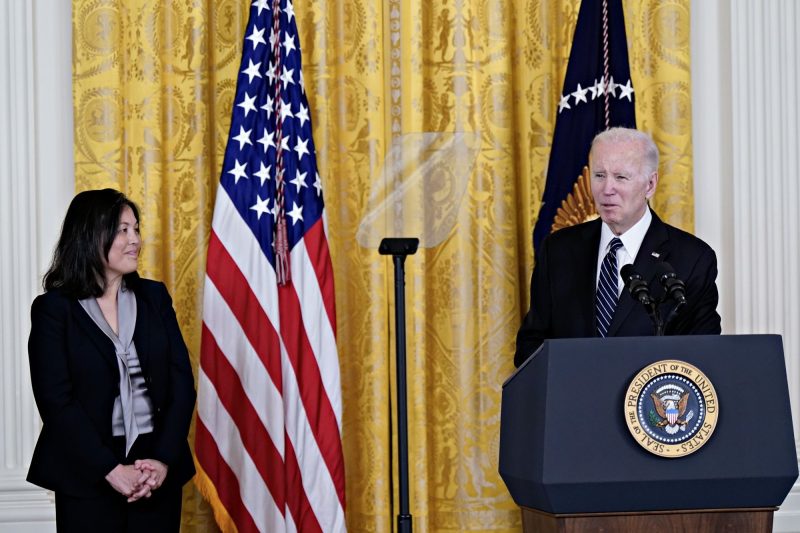
Coalition urges probe of large federal contractor’s diversity efforts
A coalition of labor and civil rights groups is urging the Biden administration to investigate allegations of systemic racism and sexism against a large private contractor that provides call-center services for federal agencies.
In a letter to Labor Department officials and a report planned for release Tuesday, the NAACP, Communications Workers of America (CWA) and Strategic Organizing Center, a labor alliance, said they “found disturbing indicators of potential systemic racial and gender disparities” at Maximus, “one of the nation’s largest federal service contractors.” (The CWA includes the Washington-Baltimore News Guild, which represents some employees at The Washington Post.)
Noting the Biden administration’s racial justice and equity emphasis, the coalition asked for a probe into whether “stark discrepancies” between the race and gender of Maximus’s employees and its upper management could violate federal policies. Maximus has worked with federal agencies including the Internal Revenue Service, the Social Security Administration and the Centers for Medicare and Medicaid Services.
The company, in response to the coalition letter and report, disputed some findings while energetically defending its record on diversity, equity and inclusion (DEI), and employee engagement.
It produced an attractive, 23-page 2022 diversity report that opens with “Diversity, equity, and inclusion (DE&I) are essential parts of our company culture” and ends by citing “our unwavering commitment to DE&I.” In 2021, the company said it began expanding its diversity team, following recommendations by Deloitte consultants. The WilmerHale firm is now conducting a racial equity audit for Maximus that is expected to be completed in September.
In a video call, a diverse group of four female Maximus executives pointed to an employee survey by PricewaterhouseCoopers that indicated about 80 percent of Maximus employees had a favorable view of its diversity efforts. One company executive mentioned several diversity programs, including a “tremendous amount of training “ the company does on unconscious bias for managers.
“We take strong issue with undocumented and uncorroborated claims and faulty research promoted in this report,” Eileen Cassidy Rivera, a company vice president, said by email. “Like all federal contractors, our operations are routinely audited by the government for hiring and promotion practices as well as for the diversity of overall staffing by location. Maximus has passed every audit conducted across our locations.”
The coalition, however, highlighted alleged disparities between call-center employees and top managers.
About 76 percent, the “vast majority,” of the company’s front-line workforce are women, according to the coalition’s analysis, and 69 percent are people of color. Black and Latina women together “are the single largest group of front line workers at 48%, but they represent only 5% of executives,” the coalition reported, citing U.S. Equal Employment Opportunity Commission data. Meanwhile, White men are almost 50 percent of upper management, but just 9 percent of front-line workers. Maximus confirmed the data.
The letter says Maximus’s workforce diversity demographics are worse than those at some agencies the company has serviced.
“If major federal agencies can deliver equitable workforce outcomes, certainly we should expect no less of major federal contractors,” the groups wrote in the letter. Their report added that “the IRS and SSA are models of equity in comparison to the vast racial and gender disparities that exist at Maximus.”
Under federal affirmative action regulations, contractors must demonstrate “good faith efforts” to remove “artificial barriers to advancement” and to expand equal employment opportunities. As part of that, “the contractor must develop and execute action-oriented programs designed to correct any problem areas” and “ensure that they consist of more than following the same procedures which have previously produced inadequate results.”
None of the federal agencies commented specifically on the coalition’s allegations against Maximus. But Social Security said contractors that do not abide by the terms of their agreements, including affirmative action provisions, could face adverse consequences. Labor’s Office of Federal Contract Compliance Programs said it could order back pay to employees if it discovers evidence of discrimination by a company.
Derrick Johnson, the NAACP’s president and CEO, said Maximus’s record “is not consistent with this administration’s effort to prioritize racial equity.” He would like to see company policies that ensure its “work culture will not continue to present a barrier for problems for African American workers,” adding, “corporations should not profit from the benefit of taxpayer dollars” while escaping accountability “for racial equity and inclusion.”
The coalition has the support of Rep. Bennie G. Thompson (D-Miss.), whose state is home to some company employees. “For years, Maximus workers in Mississippi, primarily Black women, have had to fight for better working conditions,” he said in a statement. “If we are serious about racial justice in federal contracting, the Biden Administration must investigate the unacceptable disparities at Maximus.”
Daija Arrington, a Maximus employee in Hattiesburg, Miss., said despite years of experience in customer service, she has not received the level of support she’d like for advancement.
“If I’m not qualified for the supervisor’s position, let me know,” she said in a phone call arranged by coalition advocates. “Tell me, ‘Well, hey, this is what you need. I see that you have the experience, but you need something else.’ … Tell me something so that I can actively go out and seek that.”
A company spokesperson said Arrington and any employee who isn’t getting proper feedback can talk with managers or their personnel representative, adding that “all Maximus employees are provided with access to career growth assistance tools and unlimited training.”
For Arrington, a mother of two, the most pressing workplace issues are a career path and diversity, along with “being included and having my voice being heard and being valued, as an employee.”
